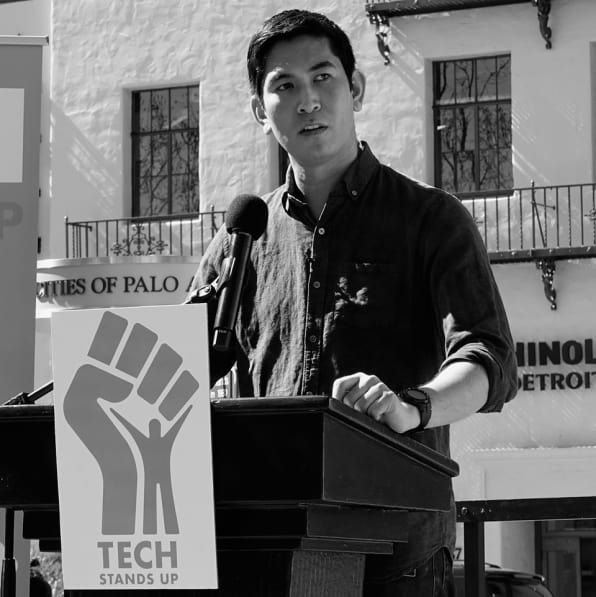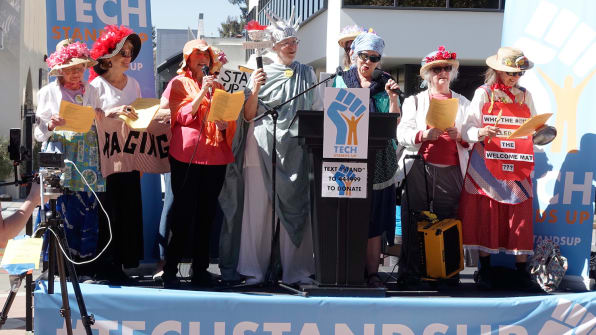Can a bunch of self-absorbed Silicon Valley tech heads break out of their bubble, team up with working-class laborers, and hit the streets to become political activists in the Trump era? That was the question hanging over the first Tech Stands Up, a political demonstration that drew about a thousand tech industry employees, janitors, farmworkers, and Bay Area progressives to downtown Palo Alto on March 14. The event was intended to kick off new political and social activism in the Bay Area technology community, which has thrived in recent years, with the election of the very pro-tech Barack Obama in 2008 and the stunning economic rebound starting around 2011. But Donald Trump’s upset victory, with his immigration and trade policies that could hurt the Valley’s business model, has started some uncomfortable soul searching in an industry not known for political activism.
“Silicon Valley has always been a community that has a lot of contradictions,” says Dex Torricke-Barton, Mark Zuckerberg’s old speechwriter and the former head of communications at SpaceX, who was one of several dozen speakers at the event. “It’s a place that talks about changing the world, but it’s also a place with this very strong libertarian streak and often distrust about the political route to changing things.”

The fledgling movement is an agglomeration of concerns and allies loosely united against much of Trump’s agenda. “We want to stand up against policies that hurt communities and families and stand up to help nonprofits and these different communities that are under attack,” says Brad Taylor. The San Francisco software engineer and his wife, Amber Allred, launched the organization with (what else?) a Facebook post on January 27.

Tech Stands Up, now a registered nonprofit organization, is meant to be more than an anti-Trump movement, says Taylor, but the election started it. “I’d be lying if I said that it wasn’t the catalyst to get me active,” he says. What further fired him up was what he considers the weak position of tech leaders in their meetings with the new president. “Nothing came of it, it was a closed-door meeting, and no one was speaking out against the policies that hurt our industry,” he says.
In our chat before the demonstration, Taylor lists a litany of his concerns including immigrant rights, global warming, fake news, net neutrality, criminal justice reform, and artificial intelligence.
While the positions and rhetoric lean left, organizers say they aim to include all political persuasions. Taylor says he has a “libertarian side” and likes the Republican emphasis on fiscal responsibility. Torricke-Barton says that some closet Republican friends of his attended the demonstration. But with such broad-ranging concerns and organizational fluidity, Tech Stands Up risks looking like Occupy Wall Street with better-groomed people who go home at the end of the day.

The Immigration Connection
At least one issue, immigration, could be the linchpin to hold the coalition together. Immigrants have founded and headed some of Silicon Valley’s biggest firms, including eBay, Google, Intel, SpaceX and Tesla (same guy, Elon Musk), and Yahoo. Half of the country’s startups valued at $1 billion had at least one immigrant founder, according to a study by the National Foundation for American Policy.
The Valley also relies on highly skilled foreign workers who come in for three to six years through the H-1B visa program, which the new administration has criticized, claiming that it takes jobs from U.S. citizens. President Trump’s first travel ban executive order on January 27 (coincidentally the same day that Tech Stands Up launched) kicked off a wave of political action in a tech industry that is heavily reliant on open borders. “There’s definitely self-interest involved,” says Torricke-Barton. “But I think with any movement, with any set of causes, you’ve gotta have that self-interest, too.”
In the process, Silicon Valley workers discovered a political cause that other groups already know well. “Immigrant workers feed the nation, and immigrant workers also help develop the technology for the future,” says Arturo Rodriguez, president of the United Farm Workers, before he takes the stage at the March 14 event. Despite the widening income gap and gentrification that the tech boom has fueled, Rodriguez hopes for an alliance. “I think that there’s already a sense that, if the two come join together, we can be even that much more successful,” he tells me.
I heard a similar take from Jane Martin, a political coordinator with Service Employees International Union (SEIU). “In the same way that the tech industry is really upset about Trump’s immigration policy, our members are really upset about it too,” she says. “And I think we share some of the same values—inclusion, diversity, immigrant rights.” They share the same buildings, too. SEIU members provide security and cleaning services at many of Silicon Valley’s biggest companies. Another speaker that day was Maria Gonzales, a janitor at Facebook who spoke about her fears of deportation for her and her family. “We’re seeing ICE (Immigration and Customs Enforcement) raids all over California,” she said through an interpreter. “We’re seeing our families being separated, and we’re seeing children having to watch their parents being deported.”
Dex Torricke-Barton is optimistic that, starting with issues that hit close to home, the Valley’s tech workers are developing a bigger political awakening. “Things like building a wall and health care provisions for the least-well-off in society, and the whole plight of refugees and immigrants—those are things that actually don’t affect a lot of Silicon Valley workers,” he says.

Starting At Home
For Taylor, just getting techies active on any issue is an important goal, and he’s trying to find ways that fit their talents. “I saw a bunch of people saying, ‘Oh, where do I donate my money to or this or that?’” he says. “If you built a website for a company or did something like that, that’s worth 15 to 20 thousand dollars.”
The Palo Alto demonstration included around 20 nonprofit organizations that were busy recruiting volunteers. Tech Stands Up’s next big event will be a hackathon from April 7-9 organized together with leaders of the Bay Area Women’s March. Techies will work on tools to help against the “attack on the press,” he says, and to support immigrants and refugees. Taylor says he was speaking with an immigrant rights group whose information material “looks like it was done in 1998 clip art,” indicating that even a little tech savvy could go a long way. Future hackathons may focus on criminal justice reforms and net neutrality, he says.
Taylor calls this approach “activism as a platform”—developing new tech-fueled ways of organizing around causes. He cites Indivisible, a Democrat-focused political organization that began with a Google doc, as an example of the new approach. Tech Stands Up seems to aspire to a facilitating role, connecting people with causes that matter to them—implicitly ones on the progressive side.
“Tech Stands Up’s feeling is that the best way to do it is to get involved locally,” says Taylor. “Get involved and donate our skills to local charities, local nonprofits, even local politicians. Run for office and participate.” The “Manifesto” that Taylor and Allred published to kick off Tech Stands Up focuses on what rank-and-file tech workers can do in their own environment.
Taylor sees links between Silicon Valley and less-fortunate communities, and believes that techies have to take some responsibility for improving conditions. The high number of H1-B visas in tech signals the failure of a U.S. educational system that doesn’t emphasize science, technology, and mathematics. It’s a problem that tech workers are uniquely positioned to take on. “How do we get our community more involved in mentoring programs, donating their skills to help get people excited about coding and science and industry?” he asks.
Arturo Rodriguez would welcome such help. “We go into these farmworker communities…they don’t have the same access to technology,” he says. “They don’t have the knowledge of it, the understanding of it. And so I think it’s important that we begin to bridge that gap.”
The ultimate local cause for tech workers may be their own offices. “I think the priority in the manifesto was cleaning up our own house,” says Taylor. Jane Martin of SEIU would like to see more support for her union’s employees. Tech firms typically use outsourcing firms to staff jobs like janitors and cafeteria workers. “They can set standards for that, right, and choose to contract with responsible companies that pay a living wage and allow them to organize,” says Martin.
Silicon Valley is also awash in claims of sexual harassment and discrimination. Efforts to improve ethnic and cultural diversity have been slow going, as well. Employees are just starting to take a stand. Susan Fowler not only left Uber due to alleged sexual harassment but publicized her experience with a blog post that had the entire company reeling. In Canada, some employees of e-commerce provider Shopify have left in protest over its role powering the online store for Breitbart News.
Taylor wants to encourage tech workers, especially those in high demand, to make ethics part of their job decision. “When you’re interviewing for a new job, be asking questions like, ‘What’s your policy on being able to give back to the community?’” says Taylor. “What’s your policy on donating your skills and time to local charities, you know, instead of, ‘How many ping-pong tables do you have in the rec room?’”
Tech Stands Up isn’t really aimed at the C-suite. “These are rank-and-file tech workers who have chosen to come out and support this cause,” says Torricke-Barton. “The kind of world that a lot of people in Silicon Valley want—that is open, connected…that world is under attack in many different ways.”
Fast Company , Read Full Story
(72)